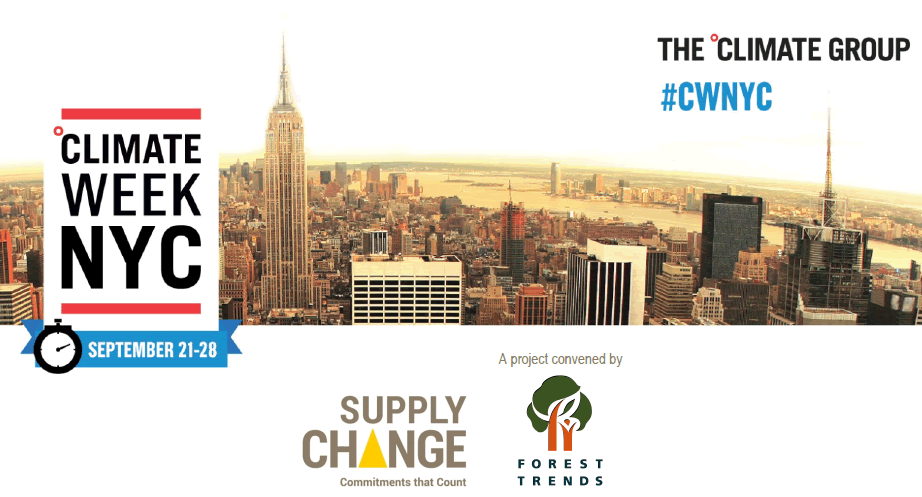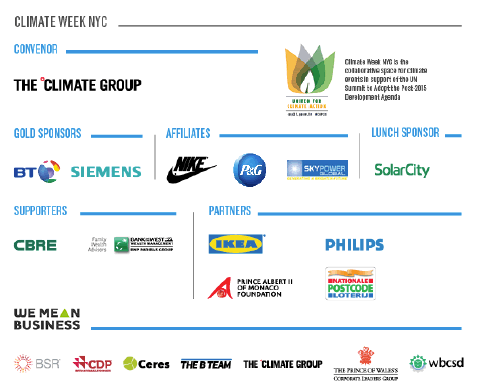Media Contact
Genevieve Bennett
[email protected]
+1 (202) 446-1982
Will Tucker
[email protected]
+1 (202) 446-1996

23 September 2015 | New York, USA | Several dozen companies that endorsed the New York Declaration on Forests at 2014’s United Nations Climate Summit are taking concrete steps to eliminate commodity-driven deforestation from their supply chains, according to a new report from Supply Change – a project convened by Washington D.C.-based non-profit Forest Trends.
The report, entitled Firm Commitments: Tracking Company Endorsers of the New York Declaration on Forests, looks at public sustainability disclosures from 41 of the Declaration’s endorser companies. Together with another 139 governments, financial institutions, indigenous community networks, and civil society organizations, these companies have formally endorsed the Declaration’s goals to halve natural forest loss by 2020 and end it completely by 2030. Buy-in from the private sector is considered especially critical to the Declaration’s ambitions because the endorser companies are deeply dependent on the “big four” commodities responsible for most agriculture-driven deforestation – palm oil, soy, cattle, and timber and pulp.
Fast forward one year, and slightly more than half of the companies examined have publicly disclosed progress toward their supply chain goals. Compared to non-endorsing companies tracked by Supply Change, the report finds that endorsers were 60% more likely to explicitly commit to zero or zero net deforestation. In the absence of a globally accepted framework to implement or verify achievement of this ultimate goal, endorsers took other concrete steps to procure certified commodities or “map” their supply chains. They were also more likely than non-endorsers to explicitly commit to protect human rights, comply with all local and national laws, and avoid expansion into peatlands.
Endorsers were more likely to have palm oil in their supply chains and also more likely to make a corresponding pledge – 94% have publicly committed to reduce deforestation risk tied to palm oil. However, the report also points out areas where endorsing companies’ performance has lagged. In two of the remaining “big four”
A project convened by
commodity areas – soy and cattle – only 41% and 50% of endorsers active in those commodities have publicly committed to change, respectively. Availability of a well-established standard appears to be a significant factor in companies’ willingness to adopt and act on a commodity commitment. For example, the Roundtable on Sustainable Palm Oil certifies 20% of global palm oil production, whereas existing certifications for soy and cattle have yet to catch on.
“The New York Declaration on Forests is a great example of how innovative, market-based approaches can combine the resources of the public and private sectors to fight forest loss,” said Forest Trends President and CEO Michael Jenkins. “This Supply Change report highlights areas where the Declaration’s endorsers can improve their reporting – in the process of demonstrating to consumers that they ‘walk the walk’ on sustainability. But as we approach the most important climate negotiations in history, these findings also reinforce that the private sector has a crucial role to play in the battle against climate change.”
Commenting on Firm Commitments, The Climate Group CEO Mark Kenber said, “To promote sustainable business practices on a global scale, we need visionary leadership from companies that operate around the world. Eliminating deforestation and promoting sustainable supply chains – especially among companies that wield such great influence – is an important step in building momentum toward a low-carbon future. “
To learn more, download the full report and visit Supply-Change.Org for updates on the project’s ongoing work to track supply chain commitments, including more than 250 company profiles to date. Be sure to follow @Supply_Change on Twitter and “like” the project on Facebook in order to keep track of the latest developments from Supply Change and its collaborators WWF, Forest Trends’ Ecosystem Marketplace and CDP. To see more of Forest Trends’ work, follow us on Twitter and Facebook.
###
About this report:
Forest Trends is the convener of the Supply Change project, and this report was authored exclusively by Forest Trends’ Ecosystem Marketplace. Other project collaborators played an important role by providing public data sources and reviewing the report.
 Forest Trends – Convener
Forest Trends – Convener
forest-trends.org
Forest Trends is a Washington, D.C.-based international non-profit organization whose mission is to maintain, restore, and enhance forests and connected natural ecosystems, which provide life-sustaining processes, by promoting incentives stemming from a broad range of ecosystem services and products. Specifically, Forest Trends seeks to catalyze the development of integrated carbon, water, and biodiversity incentives that deliver real conservation outcomes and benefits to local communities and other stewards of our natural resources. Forest Trends analyzes strategic market and policy issues, catalyzes connections between producers, communities and investors, and develops new financial tools to help markets work for conservation and people.
 Ecosystem Marketplace – Collaborator and Report Author
Ecosystem Marketplace – Collaborator and Report Author
https://www.forest-trends.org/ecosystem-marketplace/
Ecosystem Marketplace, an initiative of Forest Trends, is a leading source of news, data, and analytics on markets and payments for ecosystem services such as water quality, carbon sequestration, and biodiversity. Ecosystem Marketplace works through a range of qualitative and quantitative analyses to link practitioners and decision-makers with each other and advises companies, governments and other NGOs on carbon/forest carbon market developments, transparency, social and environmental co-benefits and other mechanisms.
 CDP – Collaborator
CDP – Collaborator
cdp.net
CDP is an international NGO that provides the only global system through which more than 5,000 companies from more than 80 countries and 207 cities report, manage and share vital environmental information. CDP now holds the largest collection globally of primary corporate environmental information and puts these insights at the heart of strategic business, investment and policy decisions. Please visit www.cdp.net or follow us @CDP to find out more.
![]() WWF – Collaborator
WWF – Collaborator
www.worldwildlife.org
WWF is one of the world’s leading conservation organizations, working in 100 countries for over half a century. With the support of almost 5 million members worldwide, WWF is dedicated to delivering science-based solutions to preserve the diversity and abundance of life on Earth, halt the degradation of the environment and combat climate change.
About Climate Week NYC
Climate Week NYC is a key event in the international calendar that brings together leading governments, investors, businesses, innovators and opinion formers. The Climate Group launched Climate Week NYC in 2009, and has acted as the secretariat since its inception. Host to more than 100 affiliate events from September 21-28, Climate Week NYC 2015 is the collaborative space for climate events in support of the UN Summit to adopt the Post-2015 Development Agenda. The Climate Group is also hosting a Climate Week ‘countdown’ from September 1 until the opening of the week; during which a series of announcements, report launches and major commitments from business and sub-national leaders will be made.
Climate Week NYC 2015 is supported by the We Mean Business coalition members: BSR, The B Team, CDP, Ceres, The Climate Group, The Prince of Wales’s Corporate Leaders Group and WBCSD.
ClimateWeekNYC.org | @ClimateWeekNYC | #CWNYC

